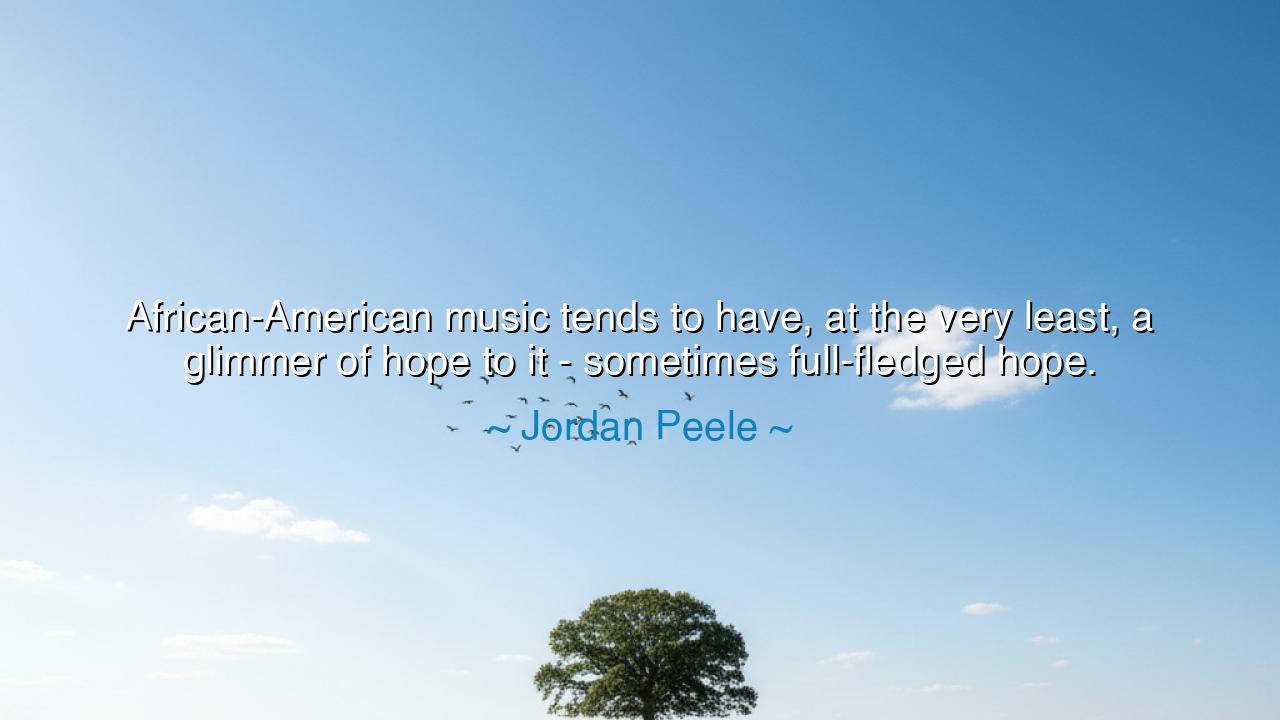
African-American music tends to have, at the very least, a
African-American music tends to have, at the very least, a glimmer of hope to it - sometimes full-fledged hope.






“African-American music tends to have, at the very least, a glimmer of hope to it — sometimes full-fledged hope.” Thus spoke Jordan Peele, a creator of stories both haunting and profound, whose words remind us that from the deepest suffering may rise the brightest light. In this reflection, he speaks not only of rhythm and melody, but of the soul of a people who, through centuries of struggle, learned to transform pain into hope, chains into song, and despair into resilience. His insight is not merely about music — it is about the unbreakable spirit of humanity itself.
To understand this truth, one must look to the origins of African-American music, born not in comfort but in captivity. On the ships that crossed the Atlantic, in the fields where the enslaved labored beneath a merciless sun, songs were born — not of luxury, but of survival. These were the spirituals, the first cries of freedom disguised in the language of faith. “Swing low, sweet chariot,” they sang, not merely as a hymn, but as a secret code, a promise that deliverance — if not in life, then in eternity — was certain. Even in bondage, the human heart refused silence. The very act of singing became an act of defiance, a declaration that though the body may be chained, the soul shall remain free.
From those early songs rose the mighty tree of African-American music — its roots in sorrow, its branches in triumph. The blues carried the laments of a people who had seen suffering too vast for words, yet it carried also the heartbeat of endurance. Jazz, with its improvisation and unrestrained freedom, was the sound of a soul breaking free from constraint — a rebellion set to melody. Gospel gave voice to faith unshaken, even when the world seemed cruel. And later, soul, R&B, hip-hop, and other forms carried the same pulse — that unmistakable glimmer of hope, flickering like a candle in darkness, sometimes small, but never extinguished.
Consider the voice of Mahalia Jackson, the “Queen of Gospel,” whose songs gave courage to the civil rights movement. When she sang, “We shall overcome,” she was not merely performing; she was proclaiming a prophecy. Her music reached beyond the church walls, beyond politics — it stirred the conscience of a nation. Or think of Louis Armstrong, who, having risen from the poverty of New Orleans, played his trumpet as though it were the trumpet of creation itself. In every note of “What a Wonderful World,” one can hear that full-fledged hope Peele speaks of — a hope not born from ignorance of pain, but from triumph over it. These artists were not simply musicians; they were the keepers of ancestral fire, passing it down through melody and rhythm to light the hearts of generations.
And yet, what makes African-American music eternal is not only its artistry but its philosophy. It teaches that even in suffering, there can be beauty; even in oppression, there can be strength. The blues singer does not deny the pain of life — he sings it, transforms it, and in doing so, transcends it. The gospel choir does not escape hardship — it confronts it with praise. The hip-hop poet, speaking of injustice and struggle, still proclaims belief in survival, in renewal, in the power to change the world. As Peele says, even at its darkest, there is always a glimmer of hope — sometimes fragile as a spark, sometimes blazing as dawn.
This is why African-American music is not merely cultural expression; it is spiritual testimony. It reminds all humankind that hope is not a luxury, but a necessity — the thread that binds us to life when all else is lost. From the sorrow songs of the enslaved to the protest anthems of modern times, the message has remained unchanged: that no matter how long the night, the morning will come. The music says, “You may strike me down, but you cannot silence me. You may take my freedom, but you cannot take my song.”
Therefore, the lesson is clear, my friends: sing, even when your heart is heavy. Create, even when the world seeks to break you. Let your pain become the forge of your strength, your melody the vessel of your hope. For as Jordan Peele reminds us, the greatness of the human spirit lies in its refusal to surrender — in its power to turn sorrow into rhythm, tears into harmony, and struggle into triumph. In that transformation lies the essence of hope, eternal and indestructible.
So let the music of the past echo within you. When life grows dark, remember those voices that rose from chains and dust to sing of freedom. Let their courage remind you that as long as one person can sing, there is still hope, and where there is hope, there is heaven — even here, upon this troubled earth.






AAdministratorAdministrator
Welcome, honored guests. Please leave a comment, we will respond soon